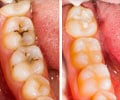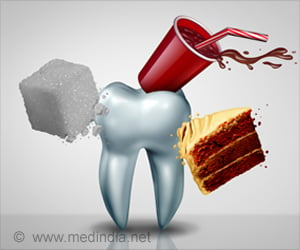High sugar consumption alters breast milk and contributes to the demineralization of tooth enamel, leading to the formation of dental caries.
- Dietary habits and breastfeeding practices rooted in infancy influence lifelong preferences
- Hence, it is advised to avoid sugar consumption and encourage exclusive breastfeeding in the first 24 months of a baby’s life
- Now, it is shown that high sugar intake and early interruption of breastfeeding might also contribute to dental caries
The new study found the increased risk of caries in the context of extended breastfeeding to correlate with sugar consumption. The results corroborate prior research findings on the role of free sugar in the development of dental caries (1✔ ✔Trusted Source
Prolonged breastfeeding, sugar consumption and dental caries at 2 years of age: A birth cohort study
Go to source).
Breast milk lactose alone doesn’t cause the problem. Practically all the children surveyed by our study were exposed to free sugar at an early age.
Impact of Timing of Sugar Introduction and Breastfeeding on Dental Caries in Infants
Dental caries was found in 22.8 percent of the 800 children tracked. In isolation, this proportion means children breastfed for more than 24 months ran a higher risk than those breastfed for 12 months or less. However, the incidence of dental caries declined in line with falling sugar consumption in the former.Information about food consumption was obtained from interviews in which mothers or carers described what the babies had eaten in the previous 24 hours. The amount of sugar added to various kinds of food and drink was also recorded.
Only 2.8 percent never consumed sugar before their second birthday, and 66.7 percent consumed food with added sugar more than five times a day. Only 7.6 percent consumed no added sugar at all in the first year of their lives.
How does Dental Caries Occur due to Breastfeeding and Sugar Intake?
High sugar consumption results in the formation of a cariogenic dental biofilm, known as bacterial plaque. Breast milk is modified by plaque and contributes to the demineralization of tooth enamel, but sugar consumption triggers this process.The frequency with which plaque is exposed to breast milk is probably the main factor in the heightened risk of dental caries observed in breastfed children over 12 months of age.
Early childhood caries update: A review of causes, diagnoses, and treatments
Go to source).
Other studies have also shown that having dental caries in infancy usually means having them in adolescence, too. Even 100 percent fruit juice is currently discouraged in the first 12 months by the WHO.
It may not contain added sugar, but the natural sugar in fruit is separated from the fiber when it is crushed, and this free sugar has similar effects to sucrose from sugarcane. The WHO’s guidelines do not discourage the consumption of whole fresh fruit and vegetables by infants, however.
Therefore, it is recommended that exclusive breastfeeding for the first six months and advocates continued on-demand breastfeeding until age 2, introducing fruit and other solid foods from the age of six months. It also advises against added sugar until age 2.
References:
- Prolonged breastfeeding, sugar consumption and dental caries at 2 years of age: A birth cohort study - (https://onlinelibrary.wiley.com/doi/abs/10.1111/cdoe.12813)
- Early childhood caries update: A review of causes, diagnoses, and treatments - (https://www.ncbi.nlm.nih.gov/pmc/articles/PMC3633299/)
Source-Medindia
















